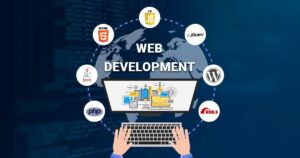
As web development continues to evolve rapidly, staying current with the latest tools, frameworks, and trends is essential for any serious developer. In 2025, the modern web developer’s toolkit blends performance, productivity, and automation — driven by both human creativity and artificial intelligence. Whether you’re building a portfolio site, a complex web app, or an enterprise platform, here’s a comprehensive overview of what you should be using this year.
1. Front-End Frameworks: Component-Based and Fast
Front-end development in 2025 is dominated by lightweight, component-driven frameworks focused on performance and developer experience.
Next.js (React-based)
Next.js remains a top choice for production-grade React apps. With powerful features like server-side rendering (SSR), static site generation (SSG), built-in routing, and full-stack capabilities via API routes, it’s the framework of choice for many developers and companies.
Key Features:
- Automatic image optimization
- App Router with server actions
- Built-in support for TypeScript and ESLint
- Seamless deployment with Vercel
SvelteKit & Qwik (Emerging Alternatives)
SvelteKit offers an ultra-lightweight approach with less JavaScript shipped to the client. Qwik, focused on “resumability,” is gaining traction for its instant loading capabilities — ideal for performance-first apps.
2. Styling Tools: Utility-First and Scalable
Styling in 2025 is largely dominated by utility-first CSS frameworks that offer rapid UI development with minimal bloat.
Tailwind CSS
Tailwind CSS continues to be the go-to choice for many developers, thanks to its scalability and design consistency. With its Just-In-Time compiler, performance is better than ever.
Highlights:
- Highly customizable via configuration
- Great plugin ecosystem (e.g., typography, forms, animations)
- Easily integrated with component libraries like ShadCN or DaisyUI
3. Version Control and Collaboration
Version control remains a critical aspect of web development workflows.
Git + GitHub
Git is still the backbone of source control, and GitHub remains the central hub for collaboration, CI/CD, and code review. In 2025, GitHub’s AI features have made code suggestions, bug fixes, and pull requests faster and smarter.
GitHub Copilot
GitHub Copilot, powered by OpenAI, is now integrated directly into most IDEs and helps developers:
- Write boilerplate code faster
- Suggest context-aware code completions
- Explain complex code blocks
This makes Copilot a valuable productivity partner — especially for junior developers.
4. Back-End Development: APIs, Databases, and Logic
Back-end development is now more API-first and serverless-friendly, aligning with modern full-stack workflows.
Node.js + Express (Classic Combo)
Still widely used for REST APIs and custom logic. Often paired with ORMs like Prisma or TypeORM for database access.
Serverless Functions
Platforms like Vercel, Netlify, and Cloudflare Workers make deploying functions globally a breeze — without managing infrastructure.
Popular Databases
- PostgreSQL: The top SQL database for structured data
- MongoDB: Preferred for flexible NoSQL needs
- Supabase: An open-source Firebase alternative that’s growing fast
5. Containers & DevOps: Build Once, Run Anywhere
For larger teams and enterprise apps, containerization and DevOps are essential.
Docker
Docker remains the standard for building and deploying applications consistently across environments. Most modern teams use Docker alongside Docker Compose for local development.
CI/CD Tools
GitHub Actions and services like CircleCI, Vercel, and Netlify CI/CD make automating tests and deployments easy, allowing developers to focus on shipping quality code quickly.
6. AI in Web Development: The New Normal
AI has become a core part of the modern web developer’s workflow.
ChatGPT & AI Assistants
Tools like ChatGPT are being used not just for debugging, but also:
- Generating boilerplate code
- Explaining unfamiliar concepts
- Writing documentation
- Even helping plan application architecture
AI Design Tools
Figma now includes AI-assisted features to automate design workflows, generate components, and suggest improvements.
7. Trends to Watch in 2025
- Edge Computing: Apps are moving closer to users with edge functions (Vercel Edge, Cloudflare Workers).
- Micro Frontends: More companies are adopting a modular approach to scale frontend teams.
- WebAssembly (Wasm): High-performance apps are starting to use Wasm for near-native speeds.
- Composable Architectures: Headless CMS, API-first platforms, and modular components are the norm.
Final Thoughts
In 2025, the web development landscape is all about speed, simplicity, and intelligence. Developers have powerful tools to build faster, cleaner, and smarter — often with the help of AI. Whether you’re just starting out or leading a tech team, mastering this modern toolkit will keep you ahead in an ever-evolving industry.




